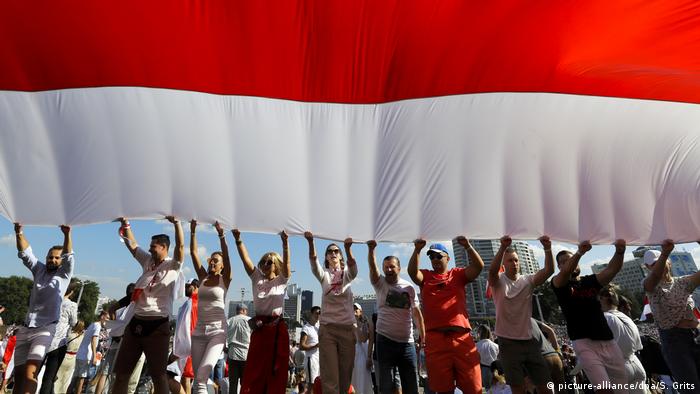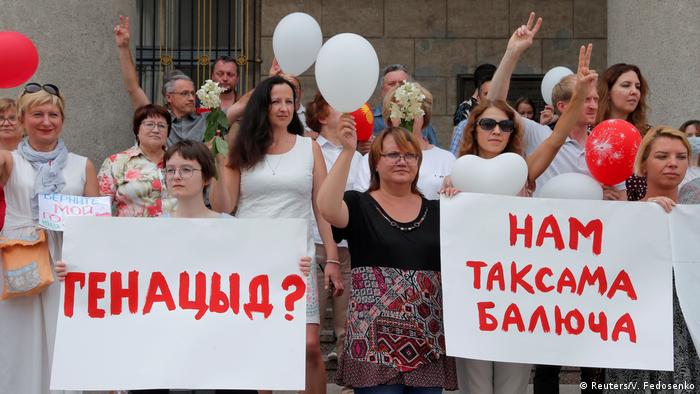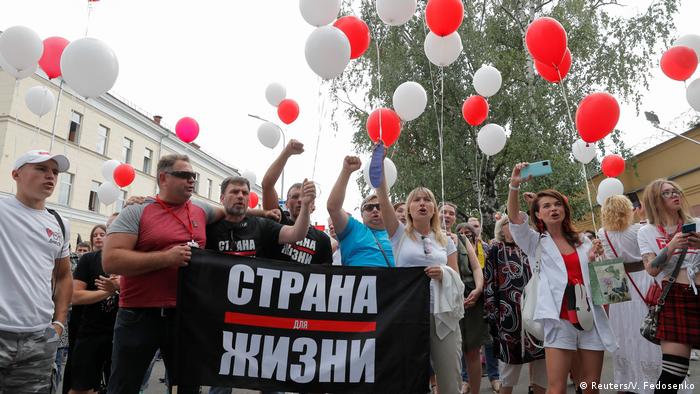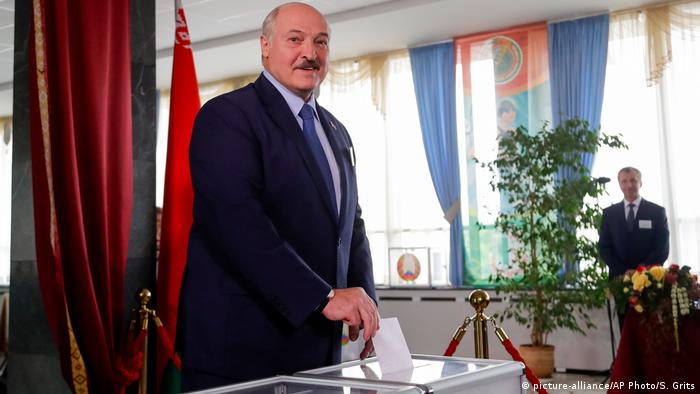Belarus: Fractures form in diplomatic elite
Belarus' ambassador to Slovakia stepped down after siding with protesters calling for President Alexander Lukashenko's resignation. Germany said it would be willing to act as mediator. DW followed how events unfolded.

Germany has renewed calls for a "national dialogue" between Alexander Lukashenko and the opposition
Belarus' ambassador to Slovakia has stepped down after declaring his support for protesters
EU leaders are to hold an emergency summit on Belarus on Wednesday where they might consider wider sanctions
All updates in Universal Coordinated Time (UTC/GMT)18:55 We are wrapping up our live updates for today. See how Tuesday's events in Belarus unfolded below.
18:30 For the tenth evening in a row, thousands have gathered to protest in Minsk's Independence Square. Footage from independent broadcaster Tut.by shows people chanting "Get out! Get out!" in a message of rejection of Lukashenko's election win.
17:50 The United Nations Security Council has held a discussion on the situation in Belarus after it was convened by Estonia and the United States.
"Using preventative diplomacy at all levels is of utmost importance for avoiding the escalation into violent conflict," said Estonian Foreign Minister Urmas Reinsalu in a statement given to the 15 members of the council.
The question of whether and how the UN would intervene in the situation remained open.
Read more: Is Belarus closer to the West, or to Russia?
17:30 After earlier carrying out military exercises on Belarus' western border, Alexander Lukashenko has now announced he ordered the army to be "combat ready" along the border.
"We don't only have internal problems; we also have external ones," he said, according to state-owned Belta news agency.
16:22 The EU should do everything to avert violence in Belarus — but also make clear it is not trying to expand its zone of influence, the head of Germany's parliament, Wolfgang Schäuble, told DW in an exclusive interview.
"Because, the way things are in Belarus right now — you can feel it — it cannot continue," he said.
16:05 People have been gathered outside the National Arts Museum in Minsk in protest of the election results for much of the day. Tuesday marks 10 days of continuous protests in the country. Cultural workers have been among those who have been loudly critical of Alexander Lukashenko since the election, which they say was rigged.

The signs read "Genocide?" and "It hurts me too"
15:45 Sweden's Foreign Minister Ann Linde has confirmed the Organization for Security and Cooperation in Europe (OSCE), a 57-member alliance of which Belarus is a member, would be willing to help conduct dialogue between factions in Belarus.
Sweden is the incoming chair of the organization. Linde said on Twitter she had "offered a visit by the OSCE in order to establish a dialogue with the opposition" to her Belarusian counterpart.
15:10 Russian President Vladimir Putin has spoken with Alexander Lukashenko by phone, Belarusian state-owned news agency Belta reported. Putin told Lukashenko about earlier phone calls with German Chancellor Angela Merkel and French President Emmanuel Macron, where they urged Putin to foster "calm and dialogue" in Belarus.
Putin has warned against any foreign influences in the former Soviet state. This phone conversation marks the fourth in five days, after Putin offered Lukashenko Russian military aid over the weekend.
15:00 US President Donald Trump has said he would talk to Russia "at the appropriate time" regarding the situation in Belarus.
At a White House event, Trump described the protests as "peaceful" and added "I like seeing democracy. It doesn't seem like it's too much democracy in Belarus."
14:35 President Lukashenko has announced he has deployed military units to Belarus' western borders, the state-owned Belta news agency reported. The Defense Ministry said they performed flights along the western border to protect the country's airspace.
Additionally, the embattled president denounced the launch of an opposition coordination council, telling Belta that it would be met with strict measures.
"We see it unequivocally: It is an attempt to seize power," Lukashenko said.
The country's Interior Ministry also acknowledged that a "small part" of the nation's police force has quit since protests began and urged more not to follow suit.
14:05 German Chancellor Angel Merkel's foreign affairs spokesman has confirmed to DW that Germany could take up a role as mediator in the Belarus crisis if asked.
"It's obvious that the elections were manipulated," Jürgen Hardt told DW. "We have so many hints of the manipulation of the elections that new elections are necessary."
"I would appreciate if the European Union itself would take this role of a negotiator or a mediator between the conflict parties," he added. "But if others ask for German politicians to do that for the German chancellor, I think we should step into that role."
Historian Karl Schögel told DW Belarus was seeing an "amazing, European moment — that is not getting enough attention in Germany. He said the protests could see real regime change in Belarus.
Watch video https://p.dw.com/p/3h7h1
Germany sees echoes of own past in Belarus13:50 Lukashenko has awarded medals for "impeccable service" to law enforcement officials who worked to crack down on protesters over the last 10 days.
In an effort to clamp down on nationwide strikes, Lukashenko's government also issued a message to state-run factories telling them to ensure that workers fulfill their duties.
13:15 EU Council President Charles Michel has spoken with Russian President Vladimir Putin about the situation in Belarus, hours after Putin warned Germany's Merkel against foreign interference in Belarus.
"Only peaceful and truly inclusive dialogue can resolve the crisis in Belarus," Michel wrote on Twitter.
13:10 Protesters have rallied at a prison in Minsk where the husband of Sviatlana Tsikhanouskaya is being held, on the tenth day of consecutive protests.
Hundreds of people gathered outside the detention birthday and sang "Happy Birthday" to popular blogger Siarhei Tsikhanouski, who was turning 42.
His wife chose to run after her husband, who has spoken out against President Lukashenko's regime, chose to contest the presidential election after her husband was detained.
Tsikhanouskaya, currently in Lithuania, has denounced the "rotting system" in Belarus.

Protesters let off balloons to mark the birthday of imprisoned blogger Siarhei Tsikhanouski in Minsk
12:25 Lithuania's parliament has overwhelmingly voted for economic sanctions against President Lukashenko's regime in Belarus.
"Today, Lithuania's parliament unanimously passed a resolution refusing to recognize the results of the elections in Belarus and Lukashenko as a legitimate President, calling for free and democratic elections and to sanction those responsible for electoral forgery and inconceivable brutalities," Lithuanian Foreign Minister Linas Linkevicius wrote on Twitter.
The sanctions were supported in a vote of 120-0 with two abstentions. Further details of the sanctions were not immediately shared.
11:19 Belarus has seen major disruptions in internet service since the disputed presidential election, with rights groups accusing the government of censorship. To get around the restrictions, many are turning to privacy apps. Read more here.
11:02 Belarusian Ambassador to Slovakia Igor Leshchenya says he is stepping down after declaring his support for anti-Lukashenko demonstrators, according to independent news portal Tut.by. Four other diplomats have followed suit.
Leshchenya said resigning from his post was the "logical step" after he recorded a video message backing the protest movement over the weekend.
"I stand in solidarity with those who peacefully protested on the streets and in the cities of Belarus to make their voices heard," the ambassador said in the video.
Slovakian Prime Minister Igor Matovic has offered Leshchenya asylum in the event that he is not able to return to Belarusia.

BELARUS IN CRISIS
Allegations of vote fraud
Alexander Lukashenko declared a landslide victory in presidential polls on August 9. According to the official count, the 65-year-old won 80% of the votes while his main challenger, Sviatlana Tsikhanouskaya, got only 10%. Lukashenko's opponents accuse him of rigging the vote to secure a sixth term after 26 years in power.
MORE PHOTOS 12345678
10:30 German Chancellor Angela Merkel has stressed that Belarusian President Alexander Lukashenko must move towards talks with the opposition "in order to overcome the crisis."
The chancellor made the comments in a phone call to Russian President Vladimir Putin.
Merkel stressed that "the Belarusian government must put a stop to violence against peaceful protesters, release all political prisoners immediately and engage in a national dialogue with the opposition and society," her spokesman Steffen Seibert said.
Read more: EU emergency summit on Belarus: What's at stake?
In a statement, the Kremlin said Putin warned Merkel that foreign interference in the ex-Soviet state would be unacceptable and could escalate the situation.
Belarusians have been protesting for 10 consecutive days against the results of the August 9 presidential election. Lukashenko claimed a landslide win, but the opposition accuses him of rigging the vote to secure a sixth term in office. The international community has widely condemned the election process and the subsequent police crackdown on demonstrators. At least two people have died in the violence and thousands of others have been arrested.
Watch video https://p.dw.com/p/3h7h1
Belarus: Protests, strikes turn up the heat on Lukashenko
Catch up on Monday's developments in Belarus here.
ed,nm/aw (Reuters, AFP, AP, dpa)
Catch up on Monday's developments in Belarus here.
ed,nm/aw (Reuters, AFP, AP, dpa)
EU emergency summit on Belarus: What's at stake?As Belarus sees continued mass anti-government protests, EU leaders will hold an emergency meeting to discuss their response to the crisis, which could include sanctions. DW's Bernd Riegert reports from Brussels.
Belarus: Protests, strikes turn up the heat on Lukashenko
The European Union does not usually convene emergency summits to discuss foreign policy. But on Monday, European Council President Charles Michel called for an extraordinary Wednesday meeting by video conference amid ongoing mass protests against Belarusian President Alexander Lukashenko and his government.
"The people of Belarus have the right to decide on their future and freely elect their leader," Michel wrote on Twitter. "Violence against protesters is unacceptable and cannot be allowed."
His invitation came after pressure from Poland and the Czech Republic. The two member states had called for an emergency summit when EU foreign ministers discussed Belarus last week.
Read more: In Belarus, privacy apps help resist internet shutdown
'Do not resort to violence'
On Monday, German President Frank-Walter Steinmeier and French President Emmanuel Macron both criticized the Belarusian government's heavy-handed response to protests that began in the wake of a contested election on August 9 which saw Lukashenko win a sixth consecutive term. Steinmeier said that he admired the courage of those who had gone out onto the street to protest peacefully. "I appeal to President Lukashenko to follow the path of dialogue — not to resort to violence," he said in Berlin, adding the Belarusian army should not "sin against its own people through violence."
Watch video Permalink https://p.dw.com/p/3h6AC
Striking workers demand Belarus president's resignation
From his vacation on the Mediterranean coast, French President Macron tweeted that the EU had had to stand up for "hundreds of thousands of Belarusians protesting peacefully for the respect of their rights, liberty and sovereignty."
Disputed election
The EU has not recognized the official election results, which claim Lukashenko won 80% of the vote. Opposition candidates and protesters argue the election was rigged. Lukashenko's main rival Sviatlana Tsikhanouskaya, who fled to Lithuania after the vote, has said that she is ready "to take responsibility and act as a national leader."
Some EU member states have called for new elections. German government spokesman Steffen Seibert said that the Organization for Security and Cooperation in Europe (OSCE) could play a role in reviewing the vote. Belarus is a member of the OSCE, which has sent election observers to the country since 2001, but the organization said Minsk did not invite any of its representatives to monitor the August 9 vote.
Read more: DW's Belarus correspondent released after 10-day arrest
Watch video Permalink https://p.dw.com/p/3h6AC
Lukashenko prepared to hold new elections? Analyst Konstantin Eggert speaks to DW Searching for consensus
Germany, which currently holds the rotating presidency of the Council of European Union, is playing the role of mediator in the current crisis. Government spokesman Seibert said that Chancellor Angela Merkel had spoken with her European partners about the situation over the weekend.
However, the EU thus far has not explicitly called for Lukashenko to step down. Whether this happens on Wednesday will hinge on consensus being reached at the emergency summit. The Hungarian government, which maintains good relations with Lukashenko, could put a spanner in the works. Last week, Hungarian Foreign Minister Peter Szijjarto called for better dialogue with Minsk. EU diplomats in Brussels said that they hoped that the summit would send a strong signal of solidarity to the opposition in Belarus.
Read more: Belarus: Arrested protesters talk of brutality
Diplomats draw up sanctions list
EU foreign ministers agreed to draw up sanctions proposals against Belarus after meeting on Friday. The list is expected to be presented at the end of next week but first it has to be determined who exactly is responsible for electoral fraud and for ordering violence against protesters and detainees. It is not yet clear whether Lukashenko himself will be on the list. "Of course we are looking at the option of expanding the sanctions to other leading figures," German government spokesman Seibert said.
Watch video Permalink https://p.dw.com/p/3h6AC
Sviatlana Tsikhanouskaya: 'I am ready to take responsibility and act as a national leader'
After the last Belarusian presidential election in 2016, the EU decided to lift most sanctions targeting Minsk, including asset freezes and travel bans against 170 individuals and three companies. A slight rapprochement took place between the EU and Belarus, just as ties seemed to be souring between Minsk and traditional close ally Moscow. Belarus participated in various European Neighborhood Policy programs, including Erasmus student exchanges and a dialogue on the rule of law. Despite its close military ties with Russia, Minsk even cooperated to a limited extent with NATO.
Read more: Opinion: For Belarus it's now or never
Avoiding a 'second Ukraine'
Now, however, Lukashenko accuses Lithuania, the Netherlands, Poland and Ukraine of orchestrating the protests in Belarus.
"We have to avoid anything that might give Russian President Vladimir Putin an excuse to intervene in the conflict militarily," an EU diplomat who preferred not to be named said. "We do not need a second Ukraine."
On Monday, Belarus began military maneuvers on its western border. Lukashenko has accused NATO of building up troops in Poland, Lithuania and Latvia to threaten Belarus. NATO has rejected the accusation: "NATO does not pose a threat to Belarus and has no military buildup in the region," Secretary-General Jens Stoltenberg said Monday. "We remain vigilant, strictly defensive, and ready to deter any aggression against NATO allies."
Watch video Permalink https://p.dw.com/p/3h6AC
DW Belarus freelance journalist released from prison
AUDIOS AND VIDEOS ON THE TOPIC
Belarus: Protests, strikes turn up the heat on Lukashenko
Date 17.08.2020
Author Bernd Riegert
Permalink https://p.dw.com/p/3h6AC
The EU should do everything to avert violence in Belarus — but also make clear it is not trying to expand its zone of influence, the head of Germany's parliament, Wolfgang Schäuble, told DW in an exclusive interview.
Watch video https://p.dw.com/p/3h7cE
'Find a way forward without further violence': Bundestag president
As Belarus faces mass protests following strongman Alexander Lukashenko's violent crackdown in the country, German Parliamentary Speaker Wolfgang Schäuble told DW on Tuesday that the European Union should ramp up pressure to ensure a non-violent solution.
"Because we can all sense that things can no longer continue as they are in Belarus now," Schäuble said.
Lukashenko has rejected protesters' calls to step down following the disputed presidential election that saw him claim victory.
In Tuesday's interview, Schäuble, who is a member of German Chancellor Angela Merkel's conservative party, appeared certain that Lukashenko's reign was drawing to a close.
"When a Dictator has come to the end of the road, it's best to find a way forward without further violence," he said. "Clearly a regime is coming to an end in Belarus as well."
EU 'responsibility'
Schäuble said the European bloc also has a "responsibility" towards its neighbors. With regards to Russia and the alliance between Moscow and Minsk, he warned that the EU was not looking to expand its influence.
"As I say, people would be wrong to think that we want to change spheres of influence," Schäuble told DW's Michaela Küfner.
"If we stand up for human rights, non-violence and democracy, that is not directed against anyone, and certainly not against Russia."
Lukashenko has been ruling Belarus since 1994. After seeking his sixth consecutive term in the August election, he arrested or forced key rivals into exile.
The wife of jailed blogger Siarhei Tsikhanouski, Sviatlana Tsikhanouskaya, became a wildcard when deciding to run again Lukashenko on the opposition's ticket. Belarus authorities claim Lukashenko achieved an overwhelming victory at the polls, held on August 9, but this has been disputed by the opposition — with protests escalating across the country following a violent crackdown.
On Monday, Lukashenko hinted there may be a new vote if a new constitution is passed.
Belarus: Tsikhanouskaya calls on security forces to switch allegiance
Belarusian opposition politician Sviatlana Tsikhanouskaya says Belarus should create a legal framework for a new fair election. She also called on security forces to switch sides from President Alexander Lukashenko.
No comments:
Post a Comment